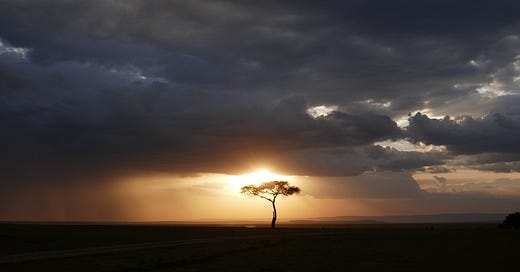There is a scent that stops time. A fragrance so primal, so utterly familiar, it bypasses thought altogether and marches straight into memory. It’s called petrichor, the perfume of rain falling on bone-dry earth.
As a neuroscientist, I’m fascinated by the brain’s network of associations. Memory fascinates me, how deeply we store our earliest and strongest experiences, and how they’re laced into our senses like thread through cloth.
From cracked earth and cattle bones. From villages in Maasailand that haven’t seen rain in months. From fields that forgot what green felt like.
It’s the smell of survival.
It’s rain meeting dust.
A scent that slaps you awake.
Petrichor doesn’t ask for your attention.
It takes it.
It rises from barren soil, earthy, musky, and rich with the memory of a time when things still grew. Technically, it’s a mix of plant oils and microbial compounds released at the first kiss of rain. But the feeling? That lives somewhere deeper. Somewhere older.
It brings the past to the surface in an instant. Childhood puddles. Rain on tin roofs. The smell of freshly cut lawn. Salty ocean air on a stormy afternoon. It doesn’t just remind you, it takes you back to the earliest of origins.
I first heard the word, and truly understood the phenomenon, out on location with Anton van Munster, filming deep in the Ndutu region of the Ngorongoro Conservation Area in Tanzania. We’d been at it for days, sunburned, sleep-deprived, coated in dust, and stalked by a persistent army of flies.
The Land Rover rattled across the endless savannah, spraying a trail of dust that clung to everything, clothes, gear, gums. My skin was so dry it had started to crack like the land beneath us. We chewed on grit, blinked through heat shimmer, and prayed the lions would appear before the light slipped away.
And then, the sky turned.
Dark, dark skies rolled in, fast and furious. The wind picked up, sharp and sudden, lifting skirts of dust. It was the kind of sky that makes you stop mid-sentence.
Anton stopped the engine. Closed his eyes.
“Smell that?” he said. “Petrichor.”
I’d never heard the word. But standing there beneath a bruised sky, thunder rumbling just beyond the horizon, I learnt something: the earth doesn’t just drink the rain, it summons it.
In Africa, we lived the dry seasons not as metaphor, but as merciless fact.
The earth wasn’t just dry.
It was split.
Ripped open like something wounded.
You’d look down and see the ground gasping, cracked lips of soil, blistered and begging. Not a blade of green, not a shadow of shade. Just dust. Endless, bloody dust. It clung to your skin, your teeth, your eyelashes.
The cattle didn’t die dramatically. They gave up slowly. Knees buckled, ribs showing, eyes dull. They lay down in the dust like they were lying down to sleep, except they never got up again.
And yet, we stayed.
Because when you’ve known the promise of rain, when you’ve smelled petrichor curling up from red soil, you don’t walk away. You wait. You hope. You listen for the wind. And you get that bloody gin bottle out as it demands for celebration.
The other day, I found myself in conversation with a man of the land. Born and bred on safari soil in East Africa. Now well into his sixties, living a safari life under the shade of Kilimanjaro. He speaks the sort of English that makes you unconsciously adjust your posture, measured, impeccably enunciated,. The kind of voice that could narrate a BBC documentary. We were talking about rain, of course, as you do when you’ve both survived droughts that leave cattle on their knees and the land cracked wide open. I mentioned petrichor, and he paused.
Never heard the word. The word was coined by two Australian scientist even before he was born.
But he knew the sensation, the hush in the air, the electricity on the skin, the scent rising from the ground like incense from some ancient altar. He knew it in his bones. He just didn’t know it had a name.
And then, before a single drop kissed the ground, we smelled it. That unmistakable, sacred scent. Petrichor. The earth’s first sigh of relief.
When we could feel it in the air, we slowed. Time did that thing it does in Africa, stretched out, yawned, and settled in for a drink. It was the signal: go fetch the gin. Legs up, silent or laughing, watching the first rains hammer our dried-out lawn. Dust turned to mud. The storm always felt like both a full stop and a fresh start.
The return of life itself.
For those who’ve never smelled petrichor, never felt the world exhale after holding its breath for far too long, I can only say this: if I could bottle it, I’d have a business by the likes of Hermès. Better than Jo Malone scented candles. More effective than therapy.
Lately, I’ve been thinking about Sir David Attenborough, how gently he’s letting us know that his season among us is drawing to a close. Not with drama. Not with noise. But with the grace of someone who has always let the wild speak first.
For decades, his voice has been our compass in the chaos. A soft voice in a loud world, guiding us through tangled forests and coral reefs, reminding us, gently, urgently, that wonder is still worth fighting for.
And now, as he prepares to step back, it feels like that stillness before the rain. The quiet. The shift. He will be remembered as Petrichor, the scent that rises when something deep and good has touched the earth.
A reminder to listen.
To protect.
To deeply respect the rain.
With love, Annelies





Beautifully described…so real, I smell it in my memory.
Love it!!